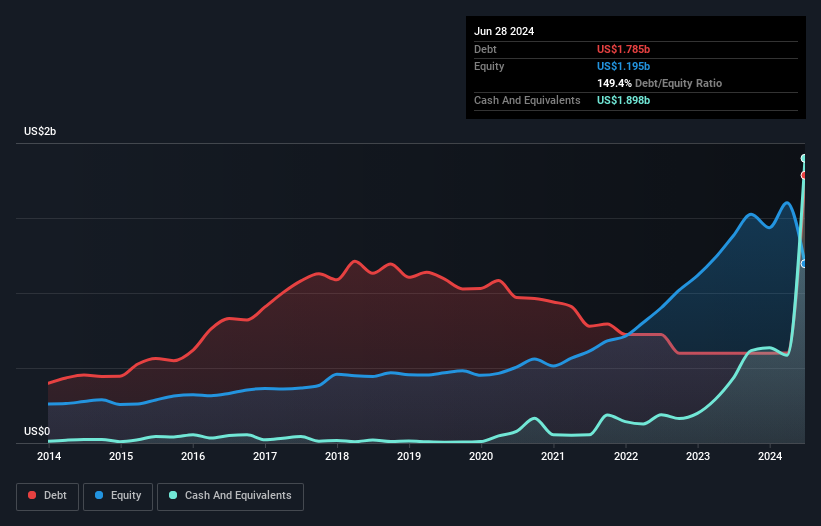- United States
- /
- Beverage
- /
- NasdaqGS:COKE
Coca-Cola Consolidated (NASDAQ:COKE) Seems To Use Debt Quite Sensibly
David Iben put it well when he said, 'Volatility is not a risk we care about. What we care about is avoiding the permanent loss of capital.' So it seems the smart money knows that debt - which is usually involved in bankruptcies - is a very important factor, when you assess how risky a company is. As with many other companies Coca-Cola Consolidated, Inc. (NASDAQ:COKE) makes use of debt. But is this debt a concern to shareholders?
What Risk Does Debt Bring?
Generally speaking, debt only becomes a real problem when a company can't easily pay it off, either by raising capital or with its own cash flow. Part and parcel of capitalism is the process of 'creative destruction' where failed businesses are mercilessly liquidated by their bankers. However, a more common (but still painful) scenario is that it has to raise new equity capital at a low price, thus permanently diluting shareholders. By replacing dilution, though, debt can be an extremely good tool for businesses that need capital to invest in growth at high rates of return. The first thing to do when considering how much debt a business uses is to look at its cash and debt together.
View our latest analysis for Coca-Cola Consolidated
How Much Debt Does Coca-Cola Consolidated Carry?
As you can see below, at the end of June 2024, Coca-Cola Consolidated had US$1.79b of debt, up from US$599.0m a year ago. Click the image for more detail. But on the other hand it also has US$1.90b in cash, leading to a US$113.0m net cash position.

A Look At Coca-Cola Consolidated's Liabilities
The latest balance sheet data shows that Coca-Cola Consolidated had liabilities of US$1.54b due within a year, and liabilities of US$2.92b falling due after that. Offsetting this, it had US$1.90b in cash and US$716.8m in receivables that were due within 12 months. So it has liabilities totalling US$1.85b more than its cash and near-term receivables, combined.
Of course, Coca-Cola Consolidated has a titanic market capitalization of US$11.3b, so these liabilities are probably manageable. However, we do think it is worth keeping an eye on its balance sheet strength, as it may change over time. While it does have liabilities worth noting, Coca-Cola Consolidated also has more cash than debt, so we're pretty confident it can manage its debt safely.
Fortunately, Coca-Cola Consolidated grew its EBIT by 6.4% in the last year, making that debt load look even more manageable. When analysing debt levels, the balance sheet is the obvious place to start. But you can't view debt in total isolation; since Coca-Cola Consolidated will need earnings to service that debt. So if you're keen to discover more about its earnings, it might be worth checking out this graph of its long term earnings trend.
Finally, a business needs free cash flow to pay off debt; accounting profits just don't cut it. Coca-Cola Consolidated may have net cash on the balance sheet, but it is still interesting to look at how well the business converts its earnings before interest and tax (EBIT) to free cash flow, because that will influence both its need for, and its capacity to manage debt. Over the most recent three years, Coca-Cola Consolidated recorded free cash flow worth 55% of its EBIT, which is around normal, given free cash flow excludes interest and tax. This free cash flow puts the company in a good position to pay down debt, when appropriate.
Summing Up
While Coca-Cola Consolidated does have more liabilities than liquid assets, it also has net cash of US$113.0m. So we don't have any problem with Coca-Cola Consolidated's use of debt. There's no doubt that we learn most about debt from the balance sheet. But ultimately, every company can contain risks that exist outside of the balance sheet. These risks can be hard to spot. Every company has them, and we've spotted 1 warning sign for Coca-Cola Consolidated you should know about.
If, after all that, you're more interested in a fast growing company with a rock-solid balance sheet, then check out our list of net cash growth stocks without delay.
New: AI Stock Screener & Alerts
Our new AI Stock Screener scans the market every day to uncover opportunities.
• Dividend Powerhouses (3%+ Yield)
• Undervalued Small Caps with Insider Buying
• High growth Tech and AI Companies
Or build your own from over 50 metrics.
Have feedback on this article? Concerned about the content? Get in touch with us directly. Alternatively, email editorial-team (at) simplywallst.com.
This article by Simply Wall St is general in nature. We provide commentary based on historical data and analyst forecasts only using an unbiased methodology and our articles are not intended to be financial advice. It does not constitute a recommendation to buy or sell any stock, and does not take account of your objectives, or your financial situation. We aim to bring you long-term focused analysis driven by fundamental data. Note that our analysis may not factor in the latest price-sensitive company announcements or qualitative material. Simply Wall St has no position in any stocks mentioned.
About NasdaqGS:COKE
Coca-Cola Consolidated
Manufactures, markets, and distributes nonalcoholic beverages primarily products of The Coca-Cola Company in the United States.
Flawless balance sheet with proven track record and pays a dividend.
Similar Companies
Market Insights
Community Narratives




